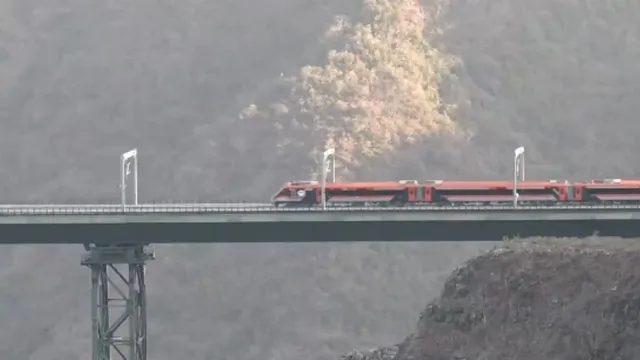BERLIN, April 7 (Reuters) - Germany's liquefied natural gas (LNG) terminal in the Baltic Sea port of Mukran operated at 5% capacity in the first quarter of 2025, an analysis showed on Monday, amid local opposition and criticism over its environmental impact and excess capacity. Germany has expanded its natural gas import options to replace Russian pipeline supply and deployed floating storage and regasification units (FSRUs), raising overcapacity concerns. Sign up here.
Utilisation of the Mukran LNG terminal dropped to 5% in the first quarter from 14% a year earlier, when it was still operating in Lubmin, a port town near the border with Poland, according to German Environmental Aid (DUH) analysis of data by Gas Infrastructure Europe. This compares with 49% and 83% utilisation rates at North Sea LNG terminals Wilhelmshaven and Brunsbuettel, operated by state-owned Deutsche Energy Terminal GmbH (DET). Marking its approval anniversary on April 9, DUH said the terminal fed only 1.

3 billion cubic meters (bcm) of gas into the grid last year, about 1.5% of Germany's total gas consumption. "The Ruegen LNG terminal is not just a fossil dead end that seriously threatens the climate and our future, it is a bad investment that was foreseeable," Sascha Mueller-Kraenner, DUH managing director, said in a statement.
The project has triggered local opposition from the resort town of Binz, saying it was hurting tourism in one of top tourist attractions for Germans and harming marine life, but legal challenges have been thrown out. Deutsche Regas, which operates the Mukran terminal, said the terminal was feeding 120–150 gigawatt hours per day into the German grid, adding it expects the volume to remain stable. "The relevance of critical energy infrastructure is not determined by short-term utilization, but rather by available capacity, utilization during periods of high demand or crises, and at most by long-term utilization," the company said.
It said it offers regasification services through "take-or-pay" slot contracts, ensuring terminal fees regardless of usage. In February, Deutsche Regas announced the termination of the charter contract for Energos Power FSRU, citing competitive disadvantages to terminals operated by DET. On Friday, Deutsche Regas launched a bidding round for long-term regasification capacity in Mukran, offering an additional 5 bcm per year from 2027 to 2043.
It also said it plans to restart a second FSRU, aiming to restore the terminal's full exit capacity of 13.5 bcm annually by 2027. Mukran's capacity was not adjusted by Deutsche Regas even after the withdrawal of Energos Power, DUH said.
Reporting by Riham Alkousaa; editing by David Evans Our Standards: The Thomson Reuters Trust Principles. , opens new tab Thomson Reuters Riham Alkousaa is politics and general news correspondent for Thomson Reuters in Germany, with focus on the energy and climate change topics, covering Europe’s biggest economy's green transition and Europe’s energy crisis..












